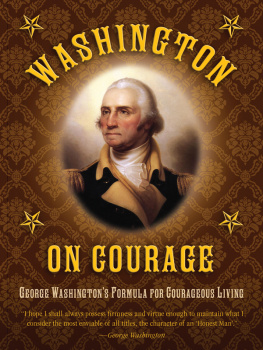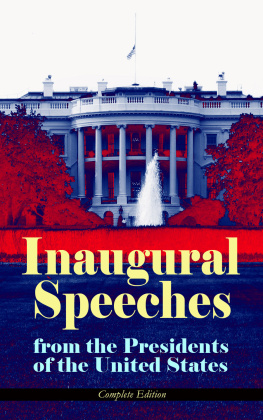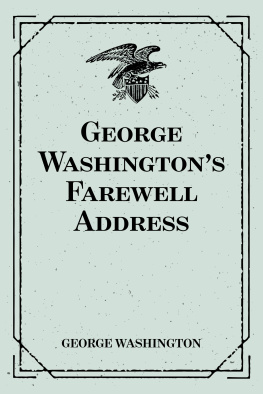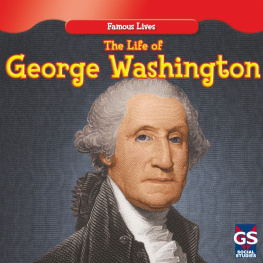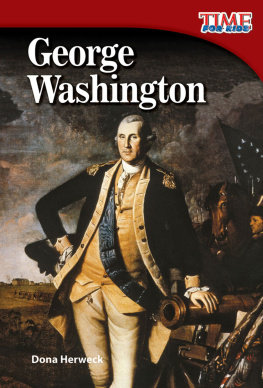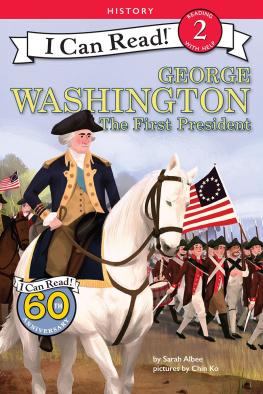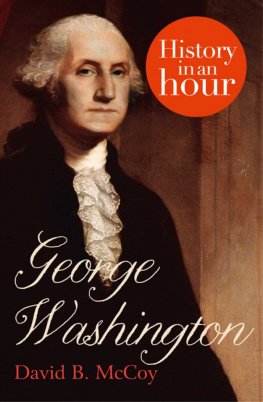WASHINGTON ON COURAGE
WASHINGTON ON COURAGE
George Washingtons Formula for Courageous Living
GEORGE WASHINGTON

Copyright 2012 by Skyhorse Publishing, Inc
All Rights Reserved. No part of this book may be reproduced in any manner without the express written consent of the publisher, except in the case of brief excerpts in critical reviews or articles. All inquiries should be addressed to Skyhorse Publishing, 307 West 36th Street, 11th Floor, New York, NY 10018.
Skyhorse Publishing books may be purchased in bulk at special discounts for sales promotion, corporate gifts, fund-raising, or educational purposes. Special editions can also be created to specifications. For details, contact the Special Sales Department, Skyhorse Publishing, 307 West 36th Street, 11th Floor, New York, NY 10018 or info@skyhorsepublishing.com.
www.skyhorsepublishing.com
10 9 8 7 6 5 4 3 2 1
Library of Congress Cataloging-in-Publication Data is available on file.
ISBN: 978-1-61608-703-6
Printed in China
The time is now near at hand which must probably determine whether Americans are to be freemen or slaves; whether they are to have any property they can call their own; whether their houses and farms are to be pillaged and destroyed, and themselves consigned to a state of wretchedness from which no human efforts will deliver them. The fate of unborn millions will now depend, under God, on the courage and conduct of this army. Our cruel and unrelenting enemy leaves us only the choice of brave resistance, or the most abject submission. We have, therefore, to resolve to conquer or die.
GEORGE WASHINGTON,
address to the Continental Army before the
battle of Long Island, Aug. 27, 1776
To be prepared for War is one of the most effectual means of preserving peace.
GEORGE WASHINGTON,
first annual address to Congress,
Jan. 8, 1790

Every post is honorable in which a man can serve his country.
Answer to an Address of the Provincial Congress of Massachusetts, 4 July, 1775
Gentlemen,
Your kind congratulations on my appointment and arrival, demand my warmest acknowledgments, and will ever be retained in grateful remembrance.
In exchanging the enjoyments of domestic life for the duties of my present honorable but arduous station, I only emulate the virtue and public spirit of the whole province of Massachusetts Bay, which, with a firmness, and patriotism without example in modem history, has sacrificed all the comforts of social and political life, in support of the rights of mankind, and the welfare of our common country. My highest ambition is to be the happy instrument of vindicating those rights, and to see this devoted province again restored to peace, liberty, and safety.
The short space of time, which has elapsed since my arrival, does not permit me to decide upon the state of the army. The course of human affairs forbids an expectation, that troops formed under such circumstances should at once possess the order, regularity, and discipline of veterans. Whatever deficiencies there may be, will, I doubt not, soon be made up by the activity and zeal of the officers, and the docility and obedience of the men. These qualities, united with their native bravery and spirit, will afford a happy presage of success, and put a final period to those distresses, which now overwhelm this once happy country.
I most sincerely thank you, Gentlemen, for your declarations of readiness at all times to assist me in the discharge of the duties of my station. They are so complicated and extended, that I shall need the assistance of every good man, and lover of his country. I therefore repose the utmost confidence in your aid. In return for your affectionate wishes to myself, permit me to say, that I earnestly implore that divine Being, in whose hands are all human events, to make you and your constituents as distinguished in private and public happiness, as you have been by ministerial oppression, and by private and public distress.
To the President of Congress, Camp at Cambridge, 10 July, 1775
Sir,
I arrived safe at this place on the 3d instant, after a journey attended with a good deal of fatigue, and retarded by necessary attentions to the successive civilities, which accompanied me in my whole route.
Upon my arrival, I immediately visited the several posts occupied by our troops; and, as soon as the weather permitted, reconnoitered those of the enemy. I found the latter strongly intrenching on Bunkers Hill, about a mile from Charlestown, and advanced about half a mile from the place of the late action, with their sentries extended about one hundred and fifty yards on this side of the narrowest part of the neck leading from this place to Charles-town. Three floating batteries lie in Mystic River near their camp, and one twenty-gun ship below the ferry-place between Boston and Charlestown. They have also a battery on Cops Hill, on the Boston side, which much annoyed our troops in the late attack. Upon Roxbury Neck, they are also deeply intrenched and strongly fortified. Their advanced guards, till last Saturday, occupied Browns houses, about a mile from Roxbury meeting-house, and twenty rods from their lines; but, at that time, a party from General Thomass camp surprised the guard, drove them in, and burned the houses. The bulk of their army, commanded by General Howe, lies on Bunkers Hill, and the remainder on Roxbury Neck, except the light-horse, and a few men in the town of Boston.
On our side, we have thrown up intrenchments on Winter and Prospect Hills, the enemys camp in full view, at the distance of little more than a mile. Such intermediate points as would admit a landing, I have since my arrival taken care to strengthen, down to Sewalls farm, where a strong intrenchment has been thrown up. At Roxbury, General Thomas has thrown up a strong work on the hill, about two hundred yards above the meeting-house; which, with the brokenness of the ground, and a great number of rocks, has made that pass very secure. The troops raised in New Hampshire, with a regiment from Rhode Island, occupy Winter Hill; a part of those from Connecticut, under General Putnam, are on Prospect Hill. The troops in this town are entirely of the Massachusetts; the remainder of the Rhode Island men are at Sewalls farm. Two regiments of Connecticut, and nine of the Massachusetts, are at Roxbury. The residue of the army, to the number of about seven hundred, are posted in several small towns along the coast, to prevent the depredations of the enemy.
Upon the whole, I think myself authorized to say, that, considering the great extent of line and the nature of the ground, we are as well secured, as could be expected in so short a time, and with the disadvantages we labor under. These consist in a want of engineers to construct proper works and direct the men, a want of tools, and a sufficient number of men to man the works in case of an attack. You will observe, by the proceedings of the council of war, which I have the honor to enclose, that it is our unanimous opinion, to hold and defend these works as long as possible. The discouragement it would give the men, and its contrary effects on the ministerial troops, thus to abandon our encampment in their face, formed with so much labor and expense, added to the certain destruction of a considerable and valuable extent of country, and our uncertainty of finding a place in all respects so capable of making a stand, are leading reasons for this determination. At the same time we are very sensible of the difficulties, which attend the defence of lines of so great extent, and the dangers, which may ensue from such a division of the army.

